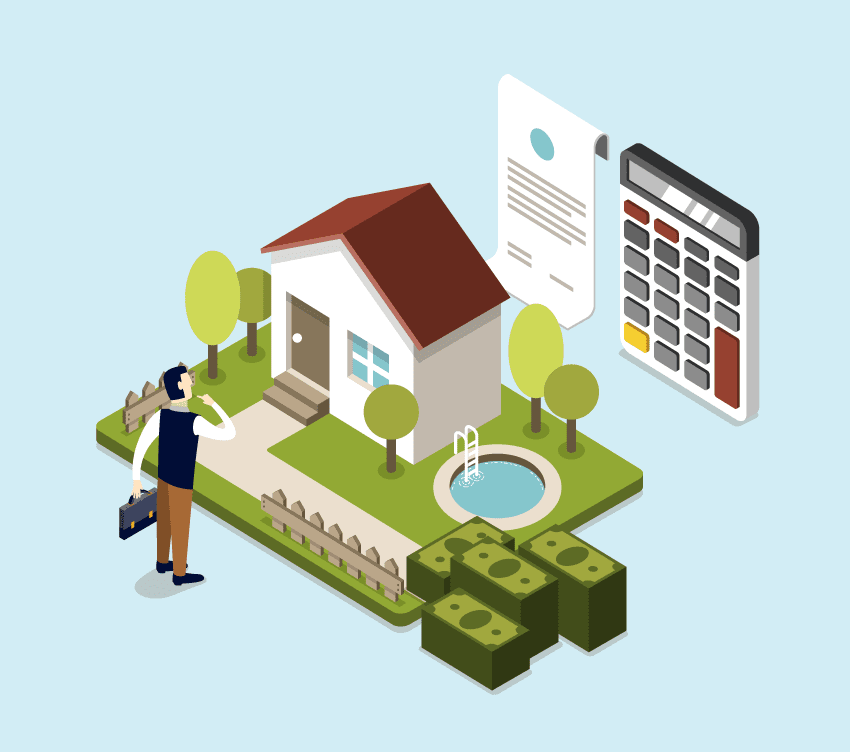For most of us, our home is the most significant purchase we will make. Which means qualifying for the loan to buy your house is vital.
Several factors affect your ability to borrow. The best starting point is to know your credit score. That score will have a significant impact on your ability to be approved for a loan of any kind, but especially a mortgage. The higher your score, the more you have shown you can handle debt, and the higher the likelihood you will be approved.
If you’re applying for a mortgage, it’s important to know how much home you can afford. Lenders use different criteria to qualify mortgage borrowers. They will likely start with your credit score, but they will also have questions about your income, your investments and even your frequency of relocation.
To ensure that you get approved, you should review your finances with a lender or housing counselor before you start house hunting. Many lenders will pre-qualify you for a mortgage , which will help you decide how much you can afford to pay for the home.
But it’s also important to know what matters to lenders, and what can affect your ability to qualify for a loan.
Factors that Impact Home Loan Decisions
Lenders won’t make a home loan to everyone. It takes steady income and a certain level of credit worthiness to qualify. Among the factors lenders consider are:
- Credit history: Have you shown you responsibly repay debt?
- Your credit score and credit report: An overall review of how you have handled debt. The higher your credit score, the better.
- Lenders want to know you have a steady source of income, which allows you to repay the debt.
- Employment history: If you are steady in one job, it says something about your long-term dependability and reliability. Bouncing frequently between jobs may lead to concerns about stability.
- In the form of stocks or bonds or other investments. These help show you have the resources to pay the loan, if ever an issue arises with your employment.
- Existing debt: Does adding this home loan put you in an untenable situation overall with debt? If you already have large amounts of credit card or other debts, a lender may hesitate to add a home loan to the pile.
The amount you plan to use as a down payment also is a consideration, which we will explain.
Value of the Asset
Lenders want to be sure they are making a loan on a piece of property that warrants the loan. Said another way, the home should be in good condition and worth the value of the loan.
The home’s condition is assessed in an inspection; an appraisal will confirm the home is worth the purchase price.
If the inspection reveals major problems – for instance if there is evidence of water intrusion in a basement – the lender may require the issue be addressed and fixed before the loan is completed.
If the appraised value is less than you are borrowing, the lender may not approve the loan for the entire amount and may require you to find more money for a larger down payment
Property Type
The type of property you are buying can affect the loan.
The easiest loan to receive is if your home is the primary residence. Which means you plan to live in the home you are purchasing.
If you want to buy a second home, say a vacation or investment home, qualifying for the loan will bring more challenges. These purchases will require a high credit score, a bigger down payment and higher debt standards to qualify.
Your Income and Debt
It’s a simple concept: Borrowers have to earn enough money to afford a loan.
Lenders will consider income, but also will consider it related to your debt – a formula called the debt-to-income ratio. They want to establish that your debt is no more than a certain percentage of your income – in most cases, no greater than 43 percent.
To calculate your debt to income ratio, divide your total monthly debt by your monthly income and multiply by 100. To verify income, lenders might ask to see pay stubs, bank statements, and even income tax returns. They also might want information on your debts.
Your Savings and Investments
The amount of money you have saved or invested can work in your favor, assuming you have a healthy portfolio. Lenders will want to know where you have money saved, and for how long.
They may ask for copies of bank statements, investment statements, and retirement account statements, perhaps going back as long as two or three years back. This factor is often important for retirees.
Providing the documented information will be important in obtaining a loan.
Employment History
A lender will want to know how long you have worked with your present employer. It shows stability, commitment, and gives the lender an idea of future income and your ability to pay the mortgage. When evaluating whether to approve a loan, lenders typically like to see at least two years of employment with the same business, and earnings for the past 24 months.
Those who are self-employed may have to show proof of income through tax returns, 1099 statements or profit and loss statements. Lenders typically like to see two years of documentation for the self-employed. That in addition to bank and investment statements can prove you are worthy of the loan.
Your Residence
How you have handled past mortgages is a good predictor when applying for a new one. If you have moved often, a lender may have concerns. If you have paid regularly and on time, a lender would be pleased.
Lenders often favor stability and consistency.
Paying Your Bills
The same principle for past mortgages applies to the way you’ve handled past bills – credit card, car loan, utility, or otherwise.
If your history shows you are conscientious and pay on time, lenders will be pleased. If it shows consistently late payments, a lender will ask questions.
Lenders are usually most concerned with how you’ve performed in the past few years. Remember that payment history is a big factor in your credit score.
A previous mortgage default can be a huge strike against you, and you often can’t qualify for a mortgage for years after a foreclosure or a short sale.
Making a Down Payment
The thinking is basic: The larger the down payment, the less money you will borrow. A smaller loan means lower payments, which improves the odds that you will qualify for the loan.
A smaller down payment may allow you to buy the home because it’s less money out of pocket initially. But remember that means you are borrowing more, which means that over time, you will pay more in interest charges.
The other advantage to a larger down payment: It can lower your interest rate. This depends on the lender, but it’s fair to say the down payment should be the highest amount you can reasonably afford.
Credit Scores
Your credit score will have the largest impact on your ability to obtain a loan. There’s not much you can do about the score when applying, because that score has been built by your past actions for several years.
The three large credit rating agencies use myriad data to assign your credit score, which is typically a number between 300 and 850. The agencies analyze how faithfully you repay credit cards, among other financial activities.
Your credit score is always changing – rising when you pay debts meticulously, falling when you fail to pay debts on time, run up big balances or use too many different credit cards. It pays to learn what factors matter when you are trying to improve your credit score.
Past behavior is often a predictor of future performance. So if you have built strong credit and a strong credit score, it will help greatly when applying for the loan.
Talk to A Credit Counselor Before Applying for a Mortgage Loan
In the short term, it’s difficult to greatly alter your credit score. However, if you are planning ahead in terms of a purchase and would like to discuss ways to help your score prior to applying for the loan, there are steps that may help. The best place to start is to talk with a nonprofit credit counselor about your debt situation. The call is free, and typically leads to a reasonable solution that will help ease your debt – and in turn build your credit.

7 MINUTE READ
Home » InCharge Blog »
Sources:
- Tomsich, E. (2022, August 31). What Do Mortgage Lenders Look at and Why? Retrieved from https://www.rockethomes.com/blog/home-buying/what-do-mortgage-lenders-look-at
- Bieber, C. (2022, March 28). 5 Factors That Determine if You’ll Be Approved for a Mortgage. Retrieved from https://www.fool.com/the-ascent/mortgages/factors-determining-mortgage-approval/
- Kielar, H. (2023, January 11). Mortgage Qualification Tips: How To Qualify For A Mortgage. Retrieved from https://www.rocketmortgage.com/learn/mortgage-qualification
- ATTOM Team (2022, Nov. 17). Steep Drop In Mortgage Lending Continues Across U.S. In Third Quarter, Hitting Three-Year Low. Retrieved from https://www.attomdata.com/news/most-recent/attom-q3-2022-u-s-residential-property-mortgage-origination-report/
- Dehan, A. (2023, January 11). How To Get A Mortgage When You’re A Self-Employed Home Buyer. Retrieved from https://www.rocketmortgage.com/learn/self-employed-mortgage

















